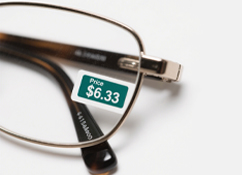A new mom in Suzhou learned a hard lesson: Her love for sugary snacks during pregnancy may have played a role in her baby’s congenital myopia. She stocked her home with candy, preserved fruits, dried fruit snacks, and ate extra fruit daily. After birth, her baby was diagnosed with nearsightedness requiring early corrective treatment. Doctors noted a possible connection: Her high - sugar diet led to excess sugar buildup in her system, which may have caused the fetal eye lens to develop too early and the eye axis to grow faster than normal—speeding up the onset of myopia.

Babies are born with “physiological farsightedness”—a normal stage of eye development. Typically, vision progresses through three phases: physiological farsightedness → emmetropia (normal vision) → myopia (nearsightedness). Normal ranges for farsightedness are roughly:
Ages 3–4: Up to +2.00 diopters
Ages 4–5: Up to +1.50 diopters
Ages 6–8: Up to +1.00 diopters
But today’s surge in childhood myopia may tie back to excess sugar intake during pregnancy. When moms eat too much sugar, it can cause a baby’s eye lens to mature prematurely. This skips the critical physiological farsightedness stage, shortening the time until myopia sets in—and raising a child’s risk of nearsightedness.

Excess sugar, whether consumed by pregnant moms or kids themselves, brings serious risks:
- Hormonal imbalances: High sugar intake raises the risk of obesity, strains the pancreas, and creates a high blood sugar environment that may lead to childhood diabetes—especially in kids with a family history of the disease.
- Malnutrition: Sugar provides empty calories (no nutrients). Eating too much crowds out essential foods, leading to deficiencies in protein, vitamins, and minerals—slowing growth and development.
- Behavioral issues: Some kids with hyperactivity, poor focus, or low grades may trace these problems to excess sugar, which can disrupt energy levels and concentration.
- Weakened immunity & sleep troubles: Studies show sugary diets lower immune function, and over 87% of people with sleep disorders report craving sweets regularly.
Excess sugar during pregnancy doesn’t just affect the mom—it can alter fetal development. As in the Suzhou case, it may accelerate eye lens maturation and eye axis growth, increasing the risk of congenital myopia. It also raises the mom’s risk of gestational diabetes, which can harm overall fetal health.
- Limit added sugars: Avoid candy, sweetened snacks, and sugary drinks. Opt for whole fruits (in moderation) over processed dried or preserved fruits.
- Focus on balanced nutrition: Prioritize protein, leafy greens, and whole grains to support fetal eye development.
- Tell stories, not scares: Explain why too much sugar hurts teeth or energy levels through simple stories (e.g., “Sugar bugs love candy—they eat your teeth if you have too much!”) to help them understand without fear.
- Swap for healthier sweets: Use xylitol - based treats (xylitol helps fight cavities) or offer fresh fruit as natural sweet snacks.
- Make it fun: Thread fruit pieces on toothpicks for “fruit skewers”—a playful way to distract from candy cravings, especially when first cutting back on sugar.
Q: Can too much sugar during pregnancy definitely cause congenital myopia?
A: It’s not proven as a direct cause, but studies and clinical cases suggest it may raise risk by altering fetal eye development. Genetics and other factors also play a role.
Q: How much sugar is “too much” during pregnancy?
A: The American Heart Association recommends no more than 6 teaspoons (24g) of added sugar daily for women. Focus on whole foods over processed sweets.
Q: If my baby has congenital myopia, can reducing sugar later help?
A: While it won’t reverse myopia, limiting sugar can support overall eye health and lower risks of other issues (like diabetes or poor focus).
A baby’s eye health starts in the womb. While congenital myopia has multiple causes, a mother’s diet—especially sugar intake—may play a role. By prioritizing balanced nutrition during pregnancy and limiting sugar for kids, parents can help protect their child’s vision and overall health.

Hi, VIVUE is a new brand dedicated to simplifying your eyewear shopping. We use tech innovation and clear operation to make getting glasses easy, reliable, and affordable for you.











